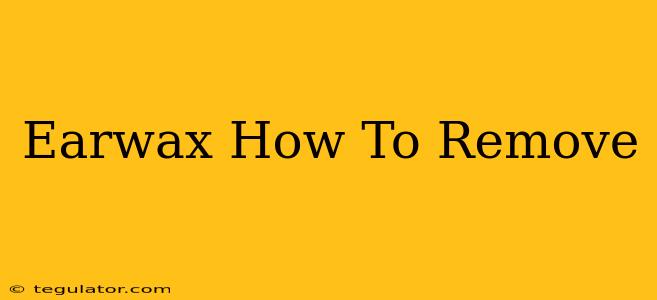Earwax, or cerumen, is a naturally occurring substance produced by glands in your ear canal. It plays a vital role in protecting your ears from infection and debris. While a little earwax is perfectly normal and even beneficial, excessive buildup can lead to discomfort, hearing impairment, and other problems. This guide explains how to safely remove excess earwax at home and when to seek professional help.
Understanding Earwax Buildup
Before tackling earwax removal, it's crucial to understand why it builds up. Several factors can contribute:
- Narrow ear canals: Individuals with naturally narrow ear canals are more prone to wax buildup.
- Hairy ear canals: Fine hairs in the ear canal can trap wax and debris.
- Cotton swabs: Ironically, using cotton swabs is a major culprit in earwax impaction. Pushing wax further into the canal instead of removing it is common.
- Hearing aids: Hearing aids can obstruct the natural flow of earwax.
- Certain medications: Some medications can affect earwax production.
Safe and Effective Earwax Removal Methods
Never insert anything small and sharp into your ear canal. This includes cotton swabs, bobby pins, or other objects, as this can cause injury, infection, and even perforation of the eardrum.
Here are some safe methods to address excess earwax:
1. Softening the Earwax
The first step in most earwax removal methods is to soften the wax. This can be achieved by:
- Warm water: Gently irrigate your ear with warm water using a bulb syringe. Be extremely careful not to use excessive pressure. This method is not suitable for everyone, and it's best to consult a doctor first if you are unsure.
- Commercial earwax removal drops: Many over-the-counter earwax removal solutions are available. Follow the instructions carefully. These drops typically contain ingredients that soften the wax, making it easier to remove.
2. Natural Remedies (Use with Caution)
Some people use natural remedies, but it's crucial to consult a doctor before trying these:
- Hydrogen peroxide: Diluted hydrogen peroxide can sometimes help soften earwax, but improper use can irritate the ear canal. Always dilute and never use it undiluted. Again, consult a doctor before trying this.
- Baby oil or mineral oil: Some people find that a few drops of baby oil or mineral oil can help soften earwax, but be cautious not to introduce too much oil, which could make the situation worse.
3. Manual Removal (Only by a Professional)
Do not attempt to manually remove hardened earwax yourself. This can easily damage your eardrum or ear canal. A doctor or audiologist can safely and effectively remove impacted earwax using specialized tools and techniques, such as:
- Curettage: Gentle scraping of the wax using a small, specialized instrument.
- Irrigation: Using a gentle stream of water to flush out the wax.
- Suction: Using a suction device to remove the wax.
When to See a Doctor
While home remedies can help manage mild earwax buildup, you should consult a doctor if you experience any of the following:
- Hearing loss: Significant earwax buildup can significantly impair hearing.
- Ear pain: Pain, itching, or fullness in the ear.
- Discharge: Pus or other fluid draining from the ear.
- Dizziness or vertigo: Feeling off-balance or experiencing spinning sensations.
- Recurring ear infections: Frequent ear infections often indicate an underlying problem.
Preventing Earwax Buildup
Prevention is key! Here are some tips to minimize earwax buildup:
- Avoid using cotton swabs: Resist the urge to clean your ears with cotton swabs.
- Regular gentle cleaning of the outer ear: Use a clean, damp cloth to gently wipe the outer ear.
- Avoid using ear candles: Ear candles are ineffective and can be dangerous.
- Consult your doctor or audiologist regularly: If you have a history of earwax buildup, regular checkups are recommended.
By understanding how to safely manage earwax and recognizing when professional help is needed, you can maintain healthy ears and optimal hearing. Remember, prevention and gentle care are your best allies in keeping your ears clean and healthy.

